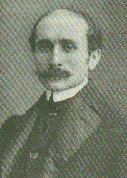 WHEN Edmond Rostand, the distinguished dramatic poet who died of pneumonia on December 2nd (1918), quitted Paris after his first world-renowned success, Cyrano de Bergerac, he gave out not the true reason for his exile to a magnificant estate in the Pyrenees, conditions of his health, but said explicitly that he was leaving the Capital of Art in order to get out of the reach of important interviewers, lionizers, et al.
WHEN Edmond Rostand, the distinguished dramatic poet who died of pneumonia on December 2nd (1918), quitted Paris after his first world-renowned success, Cyrano de Bergerac, he gave out not the true reason for his exile to a magnificant estate in the Pyrenees, conditions of his health, but said explicitly that he was leaving the Capital of Art in order to get out of the reach of important interviewers, lionizers, et al.
In other words he took a leaf from the book of the English Tennyson and intended to cultivate his talents in seclusion. There is all the difference of nationality, however, in the way the Englishman carried out his scheme of a cloistered life and the way the Frenchman did. At Cambo, if one ever got so far, there was always a welcome from Rostand who seemed, indeed, to be glad of an excuse to break his literary rule and become a delightful host. Americans who traveled thither were never turned away and often when they went to see Rostand as a mere passing traveler they ended by the poet's warm invitation by becoming for as long as they could stay the poet's guests.
Eccentric as the great French poet must have been, for everybody in Paris thus describes him, his eccentricity was purely Gallic. He wearied of his own society quickly and like a later Montaigne he went up to his ivory tower not to compose anything but himself--in slumber. A real French hermit is an inconceivable human and Rostand was not a hermit in any foreign sense.
He loved the sound of cities and only delicate health took him out of it. Because of his predilection for crowds, his dramatis personae became the longest in modern times. The very basse cour had to be a thickly settled domain to attract him. Thus he filled a scene with cock and hen, pheasant and all the denizens of the farm yard when he set about the play which in the opinion of his countrymen gives him the surest claim to immortality Chanticler.
The poet began his magnum opus shortly after he had arrived at Cambo and made the acquaintance of his feathered friends. But he was seven years writing it and re-writing it and long before it reached a public, many of the circumstances attending its composition and production had won for him the reputation which he did not justly merit, that of an unreasonable eccentric. By its unwritten history, if by nothing else, the piece won him fame and money. The very rumor of it blew for the author a glorious bubble of reputation.
Younger than Balzac when he died, Rostand in his life and habit of work seemed the antithesis of the famous novelist. Work killed the one and rest the other, unless the seeds of disease were in the poet as he always said and probably believed. Born in Marseilles, he displayed little of the meridional Frenchman in his career but indeed his career is without precedent in the literature of France. Almost from the beginning his talents were recognized and at twenty-nine when he produced Cyrano de Bergerac his fortune was made.
That play came as a reaction. Pieces in verse are not uncommon in France where they are accorded a respectful hearing but no reward, and the dramatists when Rostand began as an author were frankly matter of fact and mercenary. Who would have dreamed that a five act drama in verse with a hero whom only littérateurs remembered, composed by a writer literally unknown (except to a circle of high brows and Sarah Bernhardt) would shove him at the age of twenty-nine into the close circle of the Immortals? But Cyrano de Bergerac is more than a poetic arrangement of a drama. It is drama understandable and to be understood at once by the public. He had not written one or two failures, including La Samaritaine, without learning the playwright's trade. He had learned it thoroughly and meant to avoid by immense technique the pitfall of the study drama. Cyrano is delightful reading but it is meant for the stage.
Only a few years had passed since his first essay had failed at the Cluny. It must have been a complete failure for no enterprising manager in the encouragement of later triumphs has dared to put on Le Gant Rouge with a hope to score by these. Only a few years, as lives go, even in high literature, passed before the success of L'Aiglon dotted the "I" and crossed the "T" of Cyrano. Then came a long rest, a quiet study of barn yard life which produced Chanticler. The victory of the much-heralded piece surprised even Rostand idolaters; the French pronounce it the high mark of their intellectual history. It has never had an adequate representation in an English version although several excellent translations exist. Whether or not with an English speaking company comparable to that which Rostand himself demanded for his play in France, it would win from us the same applause as at home may be doubted. For Chanticler is a sort of French idiom, not to be easily acquired by other races.
WILLIS STEELL
Purchase Books by Edmond Rostand